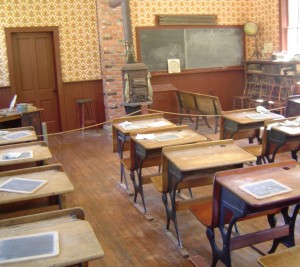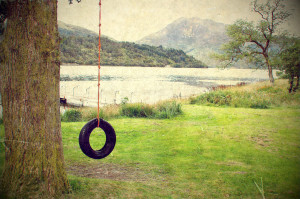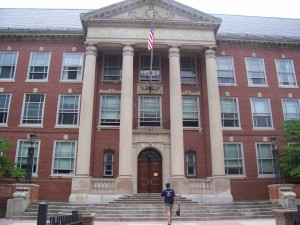submitted by jwithrow.
Journal of a Wayward Philosopher
The Ills of Compulsory Schooling Continued
January 30, 2015
Hot Springs, VA
The S&P opened at $2,019 today. Gold is down to $1,263 per ounce. Oil is still floating around $44 per barrel. Bitcoin is up slightly at $230 per BTC, and the 10-year Treasury rate opened at 1.70% today.
Yesterday we discussed the majesty that is childhood and we opined that compulsory schooling severely curtails the childhood experience and sets children up to struggle in adulthood. Today we will expand upon this and try to present a positive alternative.
First we must ask a question: why do we send our children to school?
Is it because we went to school when we were a child? Is it because we don’t have time to watch them during the day? Is it because we think they won’t learn unless they go to school? Is it because we think they must go to school in order to get into college? Is it because we think they need to go to school to learn social skills? Do we know?
Let’s glance back in time a little bit to the formative years of the modern school system:
“Ninety-nine [students] out of a hundred are automata, careful to walk in prescribed paths, careful to follow the prescribed custom. This is not an accident but the result of substantial education, which, scientifically defined, is the subsumption of the individual.” – William Torrey Harris, United States Commissioner of Education from 1889-1906
“Fitche laid it down that education should aim at destroying free will, so that, after pupils have left school, they shall be incapable, throughout the rest of their lives, of thinking or acting otherwise than as their schoolmasters would have wished.” – Bertrand Russel, British philosopher
“Children who know how to think for themselves spoil the harmony of the collective society…” – John Dewey, “father of modern education”
Eww. The school’s history textbooks left those little tidbits out.
We are on the record saying the public school system fails but that’s not entirely true. The public school system certainly fails to foster critical thinking and self-reference but that’s by design. The public school system has actually been wildly successful when judged by its original mission.
What compulsory education really does is prepare our children for an institutionalized life of subordination. We send our children to school not so they can flower into beautiful individuals capable of accessing their infinite potential but rather to mold them into obedient worker bees that will willingly assimilate into the status-quo as maintained by the establishment (governments/central banks/Wall Street/multi-nationals/Big-Agra/Big-Pharma/Big-Insurance/Big-Science/mega non-profits). This is why the public school system exists. As we’ve mentioned many times, this is not an indictment of teachers and local school employees – most of them work diligently to improve their school. But how do you reform an institution that already wildly succeeds at doing what it was created to do?
In school our children learn to hide their true self by putting on a mask and conforming to whatever is popular. They learn to follow arbitrary rules and to unquestioningly obey the “authorities”. They learn to uncritically memorize whatever information is presented to them and to regurgitate that information back in a way that is pleasing to the teacher. They learn that their job is to sit quietly and listen to the teacher without interrupting; anything else requires explicit permission. They learn that grades are the sole measurement of success thus they are conditioned to constantly seek external confirmation. They learn that life is a series of hoops to be struggled through because their educational curriculum consists of a tiered system whereby students advance to the next “grade” year after year. Children are constantly told that getting good grades is necessary to get into a good college so it is implied that the purpose of life is to successfully navigate the current system in order to make it to the next system.
So after they have successfully navigated the public school system for twelve consecutive years our children are told to mindlessly rush off to whatever college will accept them. The school system has taught them absolutely nothing about money and finance but nevertheless our children are told to take on massive student loans to pay for the next step. Some public school guidance offices will even walk children through the student loan application process. “Don’t worry”, they are told, “you won’t have to start making payments until a few years after you graduate.”
So they get to college and most students view it in the same light – as a series of hoops to jump through to get to the next level. Now the goal is to maintain a good G.P.A. so they can get a good job. A few frat parties later they find themselves completing college and going to university sponsored job fairs.
What comes next? The 8-5, new suits, public transportation, parking passes, a promotion, a new car, a mortgage, a promotion, marriage, children, a new mini-van, a promotion, a home equity line to renovate the kitchen and the next thing you know our children are middle aged, stuck in a mindless career, deep in debt, and stressed to the max. They have spent the vast majority of their time working a desk job to pay for their car, their house, their vacations, and their weekend entertainment because that is what they were conditioned to do. Sure, there are plenty of people who have found fulfillment following this path but there are far more who have not.
Suppose we changed the script? What if our children were provided the time and freedom to discover and pursue their passion at a young age? What if they were not herded into school for twelve years but instead spent that time learning about themselves and the world around them? What if they developed useful skills instead of mindless dogma?
What if they then deemed college to be a waste of time and money and instead crafted a superior higher-education curriculum. The possibilities for this are endless!
Maybe they spend one year traveling the world to learn about other cultures first hand. Maybe they find a compelling opportunity during their travels and set up an international business or charity dedicated to meeting real needs and demand. Maybe they come back and seek out an internship with a master in a field they are passionate about. Maybe they skip the internship and start their own business in their chosen field. Maybe they set out to build multiple microbusinesses designed to provide diverse income streams. Maybe they decide to pursue a specialized career and seek out additional education in that field. Maybe they decide to purchase an old neglected farm and spend their days healing the land and producing superior food products.
The point is this script would allow our children to make mindful decisions about how to spend their time free from modern society’s incessant dogma aimed at guilting people into feeling the need to fit in. This script would also allow for much greater flexibility if our children decided to change careers or lifestyles at a later time – which would be extremely common. The notion of working one job for forty years and then retiring is an unnatural New Deal relic that will soon be extinct. This model is simply not viable in any capacity; the economics just do not work.
Life is not a series of rigid systems to struggle through until retirement; it is a robust opportunity for temporal exploration and spiritual growth. It would be a shame to waste such an opportunity.
More to come,
Joe Withrow
Wayward Philosopher
For more of Joe’s thoughts on the “Great Reset” and the paradigm shift underway please read “The Individual is Rising” which is available at http://www.theindividualisrising.com/. The book is also available on Amazon in both paperback and Kindle editions.







